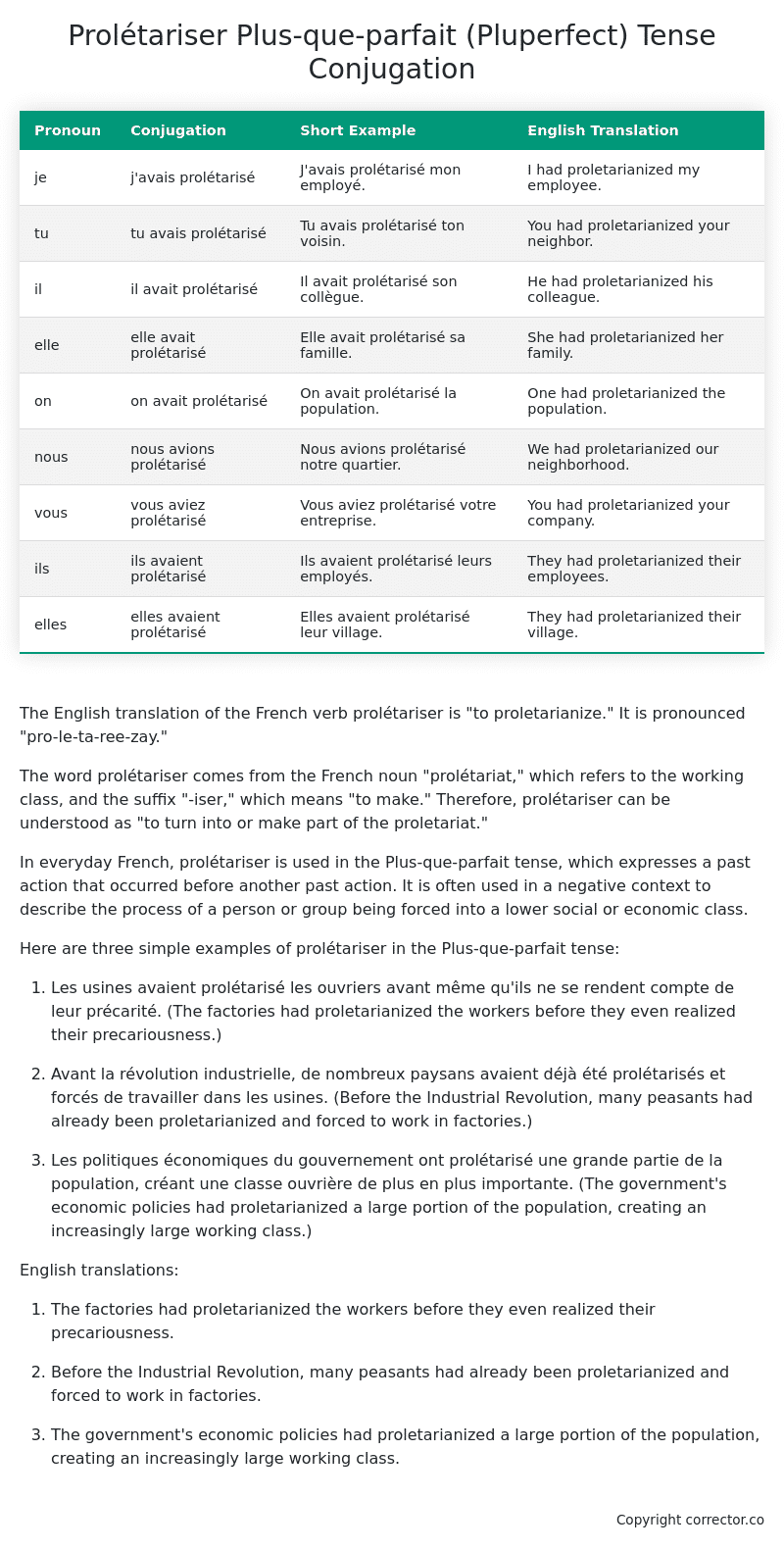Plus-que-parfait (Pluperfect) Tense Conjugation of the French Verb prolétariser
Introduction to the verb prolétariser
The English translation of the French verb prolétariser is “to proletarianize.” It is pronounced “pro-le-ta-ree-zay.”
The word prolétariser comes from the French noun “prolétariat,” which refers to the working class, and the suffix “-iser,” which means “to make.” Therefore, prolétariser can be understood as “to turn into or make part of the proletariat.”
In everyday French, prolétariser is used in the Plus-que-parfait tense, which expresses a past action that occurred before another past action. It is often used in a negative context to describe the process of a person or group being forced into a lower social or economic class.
Here are three simple examples of prolétariser in the Plus-que-parfait tense:
-
Les usines avaient prolétarisé les ouvriers avant même qu’ils ne se rendent compte de leur précarité. (The factories had proletarianized the workers before they even realized their precariousness.)
-
Avant la révolution industrielle, de nombreux paysans avaient déjà été prolétarisés et forcés de travailler dans les usines. (Before the Industrial Revolution, many peasants had already been proletarianized and forced to work in factories.)
-
Les politiques économiques du gouvernement ont prolétarisé une grande partie de la population, créant une classe ouvrière de plus en plus importante. (The government’s economic policies had proletarianized a large portion of the population, creating an increasingly large working class.)
English translations:
-
The factories had proletarianized the workers before they even realized their precariousness.
-
Before the Industrial Revolution, many peasants had already been proletarianized and forced to work in factories.
-
The government’s economic policies had proletarianized a large portion of the population, creating an increasingly large working class.
Table of the Plus-que-parfait (Pluperfect) Tense Conjugation of prolétariser
| Pronoun | Conjugation | Short Example | English Translation |
|---|---|---|---|
| je | j’avais prolétarisé | J’avais prolétarisé mon employé. | I had proletarianized my employee. |
| tu | tu avais prolétarisé | Tu avais prolétarisé ton voisin. | You had proletarianized your neighbor. |
| il | il avait prolétarisé | Il avait prolétarisé son collègue. | He had proletarianized his colleague. |
| elle | elle avait prolétarisé | Elle avait prolétarisé sa famille. | She had proletarianized her family. |
| on | on avait prolétarisé | On avait prolétarisé la population. | One had proletarianized the population. |
| nous | nous avions prolétarisé | Nous avions prolétarisé notre quartier. | We had proletarianized our neighborhood. |
| vous | vous aviez prolétarisé | Vous aviez prolétarisé votre entreprise. | You had proletarianized your company. |
| ils | ils avaient prolétarisé | Ils avaient prolétarisé leurs employés. | They had proletarianized their employees. |
| elles | elles avaient prolétarisé | Elles avaient prolétarisé leur village. | They had proletarianized their village. |
Other Conjugations for Prolétariser.
Le Present (Present Tense) Conjugation of the French Verb prolétariser
Imparfait (Imperfect) Tense Conjugation of the French Verb prolétariser
Passé Simple (Simple Past) Tense Conjugation of the French Verb prolétariser
Passé Composé (Present Perfect) Tense Conjugation of the French Verb prolétariser
Futur Simple (Simple Future) Tense Conjugation of the French Verb prolétariser
Futur Proche (Near Future) Tense Conjugation of the French Verb prolétariser
Plus-que-parfait (Pluperfect) Tense Conjugation of the French Verb prolétariser (this article)
Passé Antérieur (Past Anterior) Tense Conjugation of the French Verb prolétariser
Futur Antérieur (Future Anterior) Tense Conjugation of the French Verb prolétariser
Subjonctif Présent (Subjunctive Present) Tense Conjugation of the French Verb prolétariser
Subjonctif Passé (Subjunctive Past) Tense Conjugation of the French Verb prolétariser
Subjonctif Imparfait (Subjunctive Imperfect) Tense Conjugation of the French Verb prolétariser
Conditionnel Présent (Conditional Present) Tense Conjugation of the French Verb prolétariser
Conditionnel Passé (Conditional Past) Tense Conjugation of the French Verb prolétariser
L’impératif Présent (Imperative Present) Tense Conjugation of the French Verb prolétariser
L’infinitif Présent (Infinitive Present) Tense Conjugation of the French Verb prolétariser
Struggling with French verbs or the language in general? Why not use our free French Grammar Checker – no registration required!
Get a FREE Download Study Sheet of this Conjugation 🔥
Simply right click the image below, click “save image” and get your free reference for the prolétariser Plus-que-parfait tense conjugation!

Prolétariser – About the French Plus-que-parfait (Pluperfect) Tense
Tense Formation
Common everyday usage patterns
Sequencing of past events
Background information
Hypothetical or reported speech
Interactions with other tenses
Summary
I hope you enjoyed this article on the verb prolétariser. Still in a learning mood? Check out another TOTALLY random French verb conjugation!


